|
|
|
Sort Order |
|
|
|
Items / Page
|
|
|
|
|
|
|
| Srl | Item |
| 1 |
ID:
082367
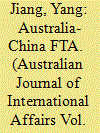

|
|
|
|
|
| Publication |
2008.
|
| Summary/Abstract |
This article seeks to explain why the Free Trade Agreement negotiation between Australia and China has been extremely difficult, despite political goodwill from Beijing and Canberra. It first argues that the reason for the slow progress of the negotiation is not caused by lack of motivation from the Chinese government. It then lists the differences in negotiation between China and Australia, focusing on their respective selective vs. comprehensive, border vs. behind-the-border, flexible vs. rigid and state vs. market approaches. It then looks into domestic politics in China to explain why China has taken such a stance, underlining domestic resistance from sectors like agriculture and services in a dynamic domestic political environment on the one hand, and the structure of the policymaking institution that constrains the power of trade negotiators on the other. It concludes by pointing out where the potential for a breakthrough in the FTA negotiation lies.
|
|
|
|
|
|
|
|
|
|
|
|
|
|
|
|
| 2 |
ID:
085957
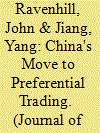

|
|
|
|
|
| Publication |
2009.
|
| Summary/Abstract |
China was a latecomer to the preferential trading bandwagon that has swept East Asia in the years since the financial crises. The Chinese government was unwilling to go down the path of negotiating bilateral and minilateral agreements until the terms of its accession to the World Trade Organization were finalized. Since then, it has become one of the most active participants in the negotiation of preferential trading arrangements, currently being engaged in negotiations with more than 20 countries. The paper will address the following questions about China's move to preferential trade: (a) What forces are driving China's approach to the negotiation of preferential trade agreements? (b) To what extent is it possible to untangle economic and political motivations in China's choice of partners for PTA negotiations? And, which economic interests are being pursued most aggressively? (c) How are conflicting domestic interests reconciled in the policy-making process? (d) To what extent will the new PTAs facilitate Chinese-dominated production networks in the regions? (e) What overall impact will the PTAs have on the Chinese economy?
|
|
|
|
|
|
|
|
|
|
|
|
|
|
|
|
| 3 |
ID:
167636
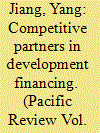

|
|
|
|
|
| Summary/Abstract |
In the aftermath of the global financial crisis, with the world in search for new economic engines, China and Japan have explicitly given their answer through their expansion of overseas infrastructure investments. This study focuses on the flagship sector of high-speed railways (HSR) and examines what kinds of development financing China and Japan have adopted in making these investments. It asks the following questions: What similarities are there in the Chinese and Japanese approaches to investments in overseas infrastructure, and how do they differ from traditional Western development financing? Also, in what ways have China and Japan changed their approaches to overseas infrastructure projects during this process? It argues that in the process of expanding overseas infrastructure investments and competing for infrastructure projects, China and Japan have become ‘competitive partners’ in challenging the traditional norms of development financing represented by the Washington Consensus and the Development Assistance Committee (DAC). To be more specific, China and Japan have adopted each other’s practices of tied commercial financing, heavy government involvement, focusing on physical infrastructure and industrialization, and showing respect for host-country forms of governance. In particular, by joining China in the new game of exporting infrastructure and through its own ‘quality infrastructure investment’ initiative, Japan has broken out of the constraints of DAC norms as an aid donor and endorsed some fundamental Chinese approaches to development and development cooperation, which in their turn were inspired by earlier Japanese practices.
|
|
|
|
|
|
|
|
|
|
|
|
|
|
|
|
| 4 |
ID:
100312
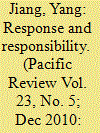

|
|
|
|
|
| Publication |
2010.
|
| Summary/Abstract |
China's behaviour in East Asian financial cooperation has overall changed from passively responding to external pressures to taking proactive initiatives, which are highlighted by Chinese elites as evidence of a sense of responsibility. China has taken varied positions towards proposals for Asian financial regionalism, from 'silent' objection, to lukewarm or superficial support, to enthusiastic participation and substantial contribution, and this variance has not always taken place in a chronological order. Despite much speculation over the trajectory of China's role in East Asian regionalism, there has not been a study focused on China's policymaking towards East Asian financial cooperation. Therefore, this paper fills the gap by analysing the factors and policymaking processes that have led to those varied positions. It argues that China, recognising the momentum in the region to enhance cooperation, has replaced the blunt dismissals of proposals, particularly those from Japan, with a more subtle approach that is aimed at ensuring China's influence and promoting the image of a responsible great power; that the extent to which it can contribute to this process is mainly constrained by its economic conditions, particularly the financial institutions.
|
|
|
|
|
|
|
|
|
|
|
|
|
|
|
|
| 5 |
ID:
106006
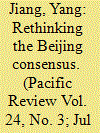

|
|
|
|
|
| Publication |
2011.
|
| Summary/Abstract |
This paper discusses the role of the Beijing Consensus type of foreign and economic policymaking in China's development since the Asian financial crisis and in its response to the global crisis, and argues that it has been a double-edged sword, as reflected in several aspects. First, the lesson that China learned from the Asian financial crisis was not the importance of liberalisation but prudence or conservativeness, which despite serving as a shield this time sustains problems in the long term. Second, an obsession with foreign reserves accumulation and the pursuit of political influence have for a long time overshadowed the increasing dependence on the US market, putting China in a dilemma now in both development and diplomatic strategies. Third, centralised decision-making may be faster than democratic processes, but it may also go against the principle of 'scientific decision' as proposed by the Chinese leadership. A prominent feature of China's responses to the crisis is a bias towards state-owned enterprises and the public sector, which exacerbates the existing problems of monopoly, over-capacity, inequality, the regulators being 'captured' by industrial interests and protectionism. Given limited economic resources, domestic political contentions and the questionable credibility of the China Model, it would be difficult for China to practice 'responsible great power' diplomacy or assume leadership in the region or globally.
|
|
|
|
|
|
|
|
|
|
|
|
|
|
|
|
|
|
|
|
|